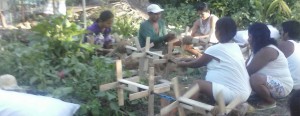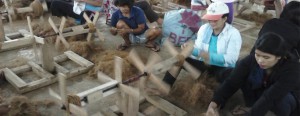
QUEZON PROVINCE, Philippines – In line with the government’s mandate to use biodegradable materials to control soil erosion, Cocos Nucifera Pacific Corporation (CNPC), a bioengineering company based in Gumaca, Quezon has completed the installation of more than 3 hectares of coconets in the Mauban-Tignaon Road Project of DPWH, Mauban, Quezon. This project which is jointly undertaken by WJ Construction and Sarca Estate Development Co will connect the town of Mauban with the town of Real located north of Quezon. Mountain slopes facing the Pacific which are affected by the road improvement are protected from eroding through bioengineering which uses coconets, cocologs and combination of vetiver and cover grasses to to prevent soil run-off.

COCONUT HUSKS
Coconut husks which are considered agricultural wastes are made useful through decorticating process whose by-products are coco fibers and coco peat. The fibers are twisted to produce hanks or ropes which are subsequently woven into coconets. It takes about 130 pieces of husks to produce one roll of 20 square meters of coconet.
PUBLIC –PRIVATE PARTNERSHIP
CNPC and the Department of Trade and Industry(DTI)-Quezon are working together to develop the coir industry of the province. Through DTI’s Shared Service Facility Program , coconet-producing groups were organized in various towns of Quezon. These groups are assured of the market since CNPC which act as their “big brother” buys all the coconets that they produce. DTI has come up with a workable roadmap to further develop the industry that will make our country the leading producer of coir products by 2016.
SOCIAL IMPACT
Coconet production has been giving income opportunities to residents of Quezon, mostly coconut farmers and their dependents. They either sell husks to CNPC or do the twining and weaving, Other groups such as beneficiaries of 4Ps, Gawad Kalinga, MWSDs and even BJMP are participating. According to Dionisio A. Balce, Operations Manager of CNPC, the mandate from the government to patronize the usage of coconets should be taken seriously. Aside from the savings that can be realized by not importing expensive nylon nets, more jobs can be created in the countryside which can help improve the country’s poverty level. Mr. Balce who can be contacted at 0928-5887288 is encouraging other groups to embark on coconet production.











Leave a Reply